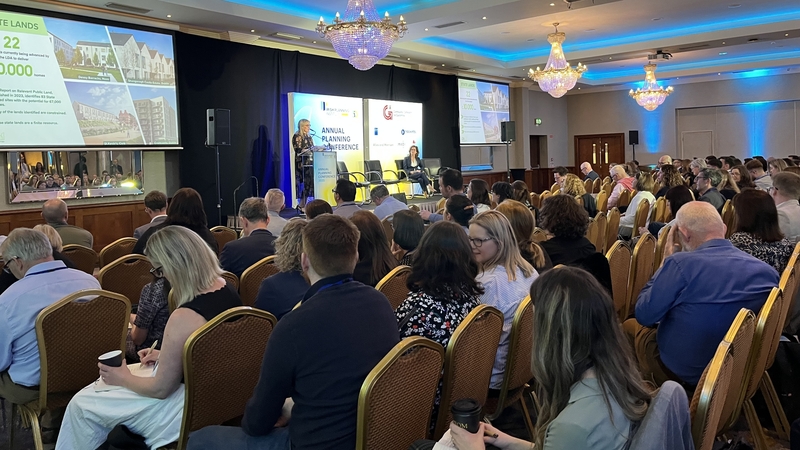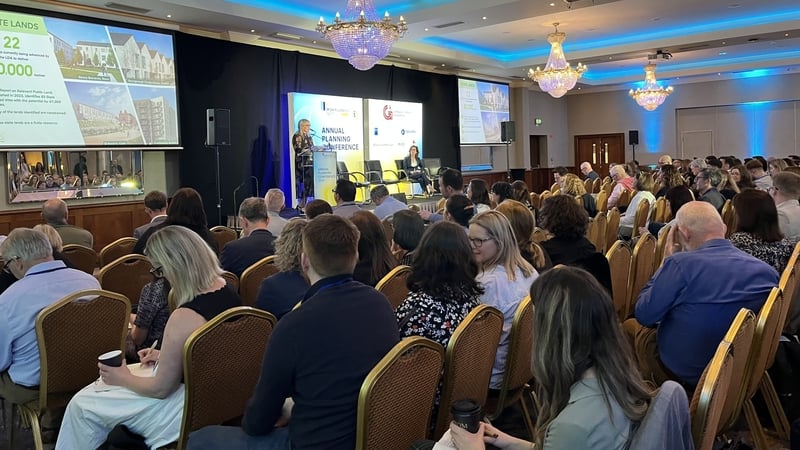Planning has become a scapegoat for the housing crisis – IPI president
Updated / Thursday, 10 Apr 2025 18:00

The Irish Planning Institute has hit back at criticism over ongoing delays in building projects around the country with IPI President Gavin Lawlor saying planning had become the scapegoat for the housing crisis and the situation was a lot more complex.
Mr Lawlor was speaking at a conference in Galway to mark the 50th anniversary of the institute.
Around one third of the country’s planners are attending these two conferences in Salthill and at the outset, attention was drawn to the lack of any Government ministers in attendance.
They said failings in the planning system is a familiar narrative but they say this is only part of the problem when it comes to the delivery of housing.
Mr Lawlor did not hold back in his opening address.
“We regularly hear from the political system – particularly at national level – that planning – and by extension planners – is a problem and the source of all our housing and infrastructure issues. I don’t believe that,” Mr Lawlor told the conference.
“I believe that planners solve problems, not create them.”
He said the consistent negative commentary was amplifying a staffing crisis within the sector and putting graduates off a career in planning.

“Planning is part of the problem but it’s not the actual problem. The housing crisis would be solved if it was that simple but this is a diverse industry which involves a huge number of people.”
Mr Lawlor said there was a lot of “misinformation” about what is causing the delay.
“There is not enough zoned land and the new National Planning Framework will hopefully help fix that but that’s a time away,” the IPI president said.
“Any changes you make now in zoning will only see houses built in three years’ time.”
“Really the issue now is the timely delivery of permissions already granted and what we can do to unlock and develop the 50% of houses that don’t get built out of the planning permissions that we’ve already granted. That’s the trick in the short term,” Mr Lawlor added.
The IPI president pointed to problems with infrastructure, housing completions and getting developers to start the building projects granted planning permission.
The chairperson of An Bord Pleanála Peter Mullan said the addition of over 100 extra staff has halved the backlog at the planning body to just over 1200 cases.
“To put it in context, we’re down from over 3,000 cases in 2023 to basically a year’s case load.”
Mr Mullan said the extra staff had made a huge difference including the appointment of 15 fulltime board members.
“There are around 20 cases from before 2024 that are being ‘actively managed’ within the next six months,” Mr Mullan told the conference.

“Any application lodged in 2025, we’re hoping to deliver on 90% of those cases within the statutory objective period which is either 18 weeks, 26 weeks or 48 weeks depending on the complexity of the case.”
“We aim to deliver within the timescale of the new Planning and Development Act which comes into force later this year,” Mr Mullan added.
“There is a misconception about the widespread availability of public lands to build houses,” said Emer O’Callaghan, who is the planning lead for development projects at the Land Development Agency.
“Not all State land is suitable for housing purposes and we also purchase land on the market for development. We have identified 32 publicly owned sites with the potential to deliver up to 15,000 homes in the next seven years.”
More stories on





